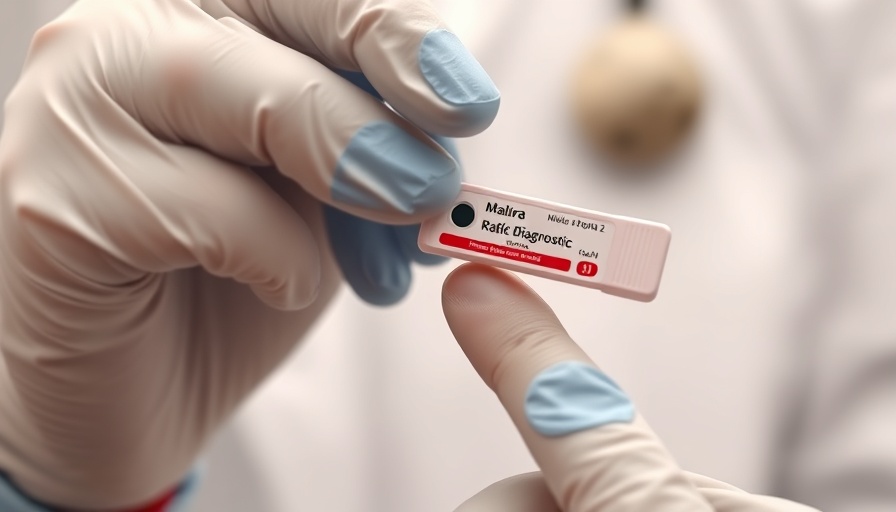
Naomi Ohene Oti’s Pioneering Impact on Cancer Care
In a significant recognition of the essential work being done in the field of nursing, Ghanaian nurse Naomi Ohene Oti has been awarded the prestigious 2025 Aster Guardians Global Nursing Award for her groundbreaking contributions to cancer care and nurse training. Selected from an impressive pool of 100,000 applicants from 199 countries, Oti's accomplishment stands as a beacon of hope and inspiration not only for nurses in Ghana but also for the global nursing community.
In 'Ghanaian Nurse Naomi Ohene Oti wins 2025 Global Nursing Award for cancer care work', the conversation highlights the impactful leadership of nurses, prompting a deeper exploration of the substantial changes needed in healthcare.
Global Recognition and Local Challenges
The honor bestowed upon Oti is more than a personal triumph; it symbolizes the collective struggles and victories of nurses worldwide. "This is not just my victory; it is a recognition of the resilience, compassion, and leadership of nurses across Ghana, Africa, and the world," Oti remarked after receiving her award.
Oti's journey in nursing began over two decades ago, motivated by a compassionate desire to alleviate suffering among cancer patients. Working primarily in resource-limited settings in sub-Saharan Africa, she has bore witness to the stark inequities in cancer care, which pose significant challenges to health outcomes. However, she has also recognized the transformative potential that nurses possess in altering these narrative through education and advocacy.
Nursing Education as a Catalyst for Change
As the head of nursing at Kleb's Oncology Center in Ghana, Oti played an instrumental role in launching training programs that elevate the standards of nursing education. Particularly pivotal was her involvement in developing Ghana's postgraduate oncology nursing curriculum in 2015, which has become a cornerstone for training future leaders in this critical field.
The urgent call for strengthened investments in nursing education and infrastructure underlies Oti's narrative. Her beliefs echo the global demand for improved conditions and remuneration for nurses, pointing out that real change requires data-driven strategies and a commitment to equity in healthcare.
The Future of Nursing in Africa
Oti's accolade arrives amid a noteworthy 28% increase in nursing applications from last year, suggesting a rising interest in the profession particularly in contexts that desperately require skilled healthcare providers. This surge reinforces the notion that investing in nursing is not merely an immediate necessity but a strategic step toward better health outcomes across the continent.
For many health professionals, the recognition and elevation of nursing correspond to broader social value systems that reward compassion and public service. As health systems face unprecedented challenges, the role of nurses as change agents has never been clearer or more critical. The global nursing community stands united, inspired by champions like Oti, striving tirelessly against barriers to quality care.
Ghana's Place in the Global Nursing Landscape
As African nations grapple with healthcare delivery challenges, leaders like Naomi Ohene Oti exemplify how localized efforts can impact global health discussions. By shining a spotlight on the valuable contributions made by nurses, we not only celebrate individual achievements but also address pressing issues in healthcare accessibility, especially in underserved communities.
Oti's journey is a reminder that the pathways to success are paved with dedication and commitment to public health. Nurses are not just caregivers; they are trailblazers who mold the future of the health systems in which they operate.
A Call for Action: Investing in Our Nurses
The implications of Oti’s recognition extend beyond personal accolades. It is crucial for governments and institutions to align their policies with the urgent demands for nursing education and career development. Striking a balance between adequate funding, systematic support, and equity-driven initiatives must become a priority for every country, especially in Africa, where healthcare crises are often most acute.
As we applaud Naomi Ohene Oti for her outstanding work, let’s rally together to advocate for the changes necessary to ensure that nurses in Ghana and throughout the continent receive the respect, support, and resources they urgently need.
Ultimately, advocating for a robust nursing profession is tantamount to advocating for the health and well-being of communities. Empowering nurses is not just a healthcare investment; it’s an investment in the future of Africa.
 Add Row
Add Row  Add
Add 




Write A Comment